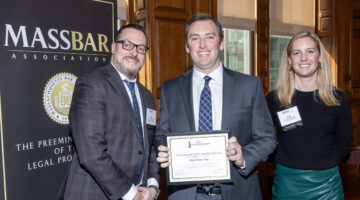Here is a breakdown on how new Federal and State decisions clarify Massachusetts Chapter 93A Unfair and Deceptive Trade Practices Law in Business-to-Business Disputes
A flurry of judicial decisions in spring 2023 has shed new light on business-to-business claims brought under the Massachusetts unfair and deceptive trade practices law, Chapter 93A. In just the past two months, the Massachusetts Appeals Court, the First Circuit Court of Appeals, and the U.S. District Court for the District of Massachusetts have each issued rulings addressing the scope and applicability of section 11 of Chapter 93A. This is the portion of the statute that provides a right of action to businesses that suffer a loss of money or property due to another’s unfair or deceptive conduct. Given the near ubiquity of Chapter 93A claims in commercial litigation matters in Massachusetts, understanding these new rulings is crucial for companies that are, or may become, involved in litigation within the Commonwealth.
Monetary damages are not needed to establish Chapter 93A liability
Chapter 93A is one of the most frequently invoked statutes in Massachusetts business litigation—in no small part because a successful claim under this law entitles the plaintiff to recover its attorney’s fees as well as potentially double or treble damages. But to recover anything in connection with one’s Chapter 93A claim, it is necessary for the plaintiff to show that the defendant’s unfair or deceptive misconduct caused it to suffer some loss. While this “loss” most often takes the form of lost profits or other monetary damages, the federal district court in Massachusetts made clear in a May 30, 2023, decision that monetary harm is not necessary to trigger a recovery under Chapter 93A.
In Benchmark Technologies, Inc. v. Tu,1 a company that designs products for customers in the semiconductor industry sued its former employee, Yuqian Tu, under Chapter 93A, section 11 for stealing its trade secrets and using them to start a competing business. The court ruled in Benchmark’s favor on liability and issued a permanent injunction, barring Mr. Tu from using the company’s trade secrets, but it also found that Benchmark had not suffered any monetary damages. Because of that fact, Mr. Tu argued that he should not be liable under Chapter 93A, which requires a showing that the unfair or deceptive practice “had some adverse effect” on the party claiming harm. The court, however, rejected Mr. Tu’s argument and ruled that a Chapter 93A violation could exist in the absence of any monetary harm where the company had “demonstrated [a] risk of future actual loss.” As the court explained, by stealing Benchmark’s trade secrets, Mr. Tu had created an “unquantifiable adverse effect,” i.e., the possibility that the theft would eventually cause Benchmark to suffer a loss. The court also pointed to its entry of a permanent injunction in Benchmark’s favor in further support of its decision to find a Chapter 93A violation and, accordingly, to permit Benchmark to recover its reasonable attorney’s fees.
Although a contracting party may take an “unreasonable” and even “baseless” position, a Chapter 93A claim will not necessarily be supported if there is no evidence of bad faith.
The law is well-settled that, while a mere breach of contract is not sufficient standing alone to constitute a Chapter 93A violation, the statute does prohibit a party from breaching its contractual obligations for the purpose of extracting some extra-contractual advantage from its counterparty. Drawing the line between a common breach of contract and the type of breach that gives rise to liability under Chapter 93A can be challenging, as the Massachusetts Appeals Court recognized in its May 24, 2023, decision in Bickford’s Family Restaurants, Inc. v. Waltham Ventures, LLC.2
In Bickford’s, a real estate contract dispute arose between a restaurant, Bickford’s, and Waltham Ventures, which had agreed to purchase certain property rights that Bickford’s held. Waltham Ventures failed to make a payment that was required under the purchase agreement, taking the position that the contract could be interpreted in a way that allowed it to avoid that payment. Bickford’s filed suit alleging breach of contract and violation of Chapter 93A. According to Bickford’s, the position Waltham Ventures took with respect to its payment obligations under the contract was so clearly and obviously contrary to the contract’s actual language that, by taking such a position, Waltham Ventures had acted unfairly and deceptively.
Affirming the lower court’s ruling, the Massachusetts Appeals Court disagreed with Bickford’s and held that Waltham Ventures’ interpretation of the contract was indeed wrong but did not give rise to liability under Chapter 93A. The Appeals Court ruled that, although Waltham Ventures’ position was “unreasonable” and in fact “baseless,” it was the result of an honest disagreement about the terms of the contract. Where the defendant’s conduct is based on a genuine misunderstanding of the contract—however incompetent that understanding may be— the defendant will not be held liable for violating Chapter 93A. Rather, as the court held, a violation of Chapter 93A in a contract interpretation dispute requires proof that the defendant’s position was not honestly held but was actually taken in bad faith for the purpose of obtaining some advantage over the plaintiff. Because Bickford’s could not prove any dishonesty or bad faith on Waltham Ventures’ part, the Chapter 93A claim was rightly dismissed.
Chapter 93A claims are not barred by standard contractual choice-of-law provisions.
One important consideration for Massachusetts companies that do business with out-of-state entities is, which state’s laws will govern the agreement? Where a written contract exists between the parties, the answer to this question can often be found in a choice-of-law provision, which typically specifies that the contract at issue will be construed under the laws of a particular state (e.g., where one of the parties is located or where the contract will be substantially performed). But where the parties select a state other than Massachusetts to govern their contract, there is a question as to whether the Massachusetts-based party retains the ability to bring a claim under Chapter 93A when the counterparty engages in unfair or deceptive conduct.
The First Circuit Court of Appeals addressed this question in its April 19, 2023, decision in Kleiner v. Cengage Learning Holdings II, LLC.3 In this dispute, an author in Boston sued his New York-based publisher for violating Chapter 93A by making false and misleading statements about how royalties would be calculated. The choice-of-law provision in the parties’ contract stated, “This Agreement shall be construed in accordance with the laws of the State of New York.” Citing that language, the publisher argued that the author’s claim under Chapter 93A (a Massachusetts law) was prohibited.
The First Circuit rejected that claim, noting that Chapter 93A is not a contract-based claim and is not part of the parties’ agreement, even if the claim arises out of a contracting party’s misconduct in the course of performing its duties thereunder. Accordingly, Chapter 93A claims are not barred under choice-of-law provisions stating that “the agreement” shall be governed by a state’s laws other than Massachusetts. That being said, the court further explained that contracting parties could preclude Chapter 93A claims if they so choose, provided that they wrote their contracts using broader language that was not limited to their agreement itself. Specifically, the court found that a choice-of-law provision could bar Chapter 93A liability if it was written to encompass not only the agreement itself but all of “the rights of the parties” as being governed by another state besides Massachusetts. In other words, parties can choose to contractually waive their right to bring a Chapter 93A claim, but only where they expressly contract to forego their rights under Massachusetts law by choosing to have another state’s laws govern those rights.
Understanding Chapter 93A’s breadth and application is crucial to successfully prosecuting or defending your business-to-business dispute.
As these newly issued decisions underscore, the law on Chapter 93A is complex and requires near-constant interpretation. With the potential to recover multiple damages and attorney’s fees for a successful Chapter 93A claim, plaintiffs in business litigation find it almost impossible to resist including these claims in their cases—even where it doesn’t belong. Courts are therefore frequently tasked with determining whether the law’s requirements are satisfied in a given case. Navigating these requirements requires a well-honed understanding not only of what constitutes an unfair or deceptive practice under Chapter 93A, but also how to prove damages (especially in the absence of monetary loss), and under what circumstances can contractual language prohibit claims brought under the statute. Developing this understanding of the relevant Chapter 93A case law, or engaging counsel who has it, is an essential tool for businesses facing commercial disputes in Massachusetts with suppliers, vendors, partners, landlords, or any other contracting party.
Kenneth N. Thayer is a Business Litigation Attorney at Conn Kavanaugh Rosenthal Peisch & Ford, LLP In Boston, MA.
He can be reached at kthayer@connkavanaugh.com
1 2023 WL 3727913 (D. Mass. May 30, 2023).
2 2023 WL 3605985 (Mass. App. Ct. May 24, 2023).
3 66 F.4th 28 (1st Cir. 2023).
Share with your network:


